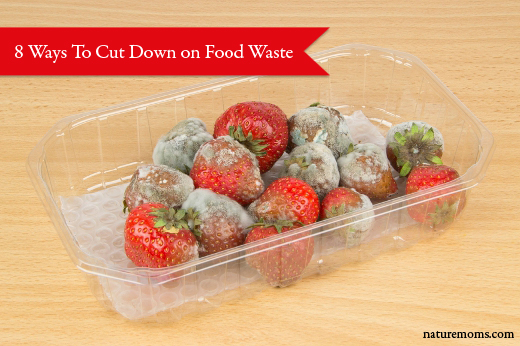The average US household wastes a lot of food. I know I have definitely been guilty of this myself in the past. If we have to clean out our fridge once a month and throw half the contents away spoiled, unused, and moldy then we are wasting food and wasting money. How much of our monthly food bill is actually tossed in the garbage? $20? $30? This has an impact on your finances and it impacts the planet because we use more than we need. So how do we nip this problem in the bud? Here are 8 ways that I have tamed this monster over the years.
1. List the leftovers. This is an incredibly simple and incredibly useful way to remind you to eat the leftovers! Put a magnetic pad on your refrigerator, you can usually get one for $1 at the dollar store or in the dollar bin at Michael’s Craft Store. When you put leftovers in the fridge, note the item and date. Aka “Sweet and Sour Soup 2/10”. The list will look right at you when you go to browse for your next meal or snack, even if the leftovers end up out of sight in the back of the fridge. It is also useful for spouses who are looking for something to take to lunch and perhaps didn’t know there were leftovers.
2. Freeze whatever you can. If you buy in bulk, buy those food items that can be frozen. For instance I buy almonds and other nuts in bulk and freeze most of them. Periodically I fill glass jars I keep in the refrigerator with the nuts until all are used. Freeze refrigerated leftovers after 3-4 days.
3. Discover some creative uses for your leftovers and unused food. Shepherd’s pie, vegetable soup, and casseroles are just some of the creative ways you can use your leftovers. Vegetables that are getting old but are not yet bad can be used to make vegetable stock that you can use immediately or freeze. Stale bread can be used to make bread crumbs and croutons, which you can freeze if you do not need them right away. Stale bread can also become bread pudding. Leftover meat can be incorporated into salads, burritos, soups, and stews.
4. Store refrigerated foods in the right places. The back of your refrigerator is colder than the front, and the door shelves are warmer still. Relegate dairy foods that are prone to spoilage to the back of the fridge, and keep items such as condiments and salad dressings toward the front or in the door.
5. When it’s too late, compost your spoiled food. Then you can use the compost to grow your own food. The circle of life baby…
6. Skip the counter top fruit bowl if you aren’t going to use fruit within a day or two and refrigerate it instead. Some foods, such as tomatoes, do not do well under refrigeration but apples, oranges, grapefruits, and lemons last much longer in the crisper drawer of your fridge. Make green smoothies if your fruit is starting to look sad.
7. Plan your grocery shopping and meals carefully to avoid waste. Go through your pantry and frig and make menu decisions based upon what you already have. If you have cilantro wilting in the frig then use the Internet to search for “cilantro recipes”. Look for recipes that utilize ingredients that you have already for the most part. Doing this allows you to use items before they go bad and you get to try new recipes.
Another tactic to go along with this same planning theme is buy up the bulk of what you need minus the produce. Then on the way home from work, errands, etc pick up the mushrooms you need to go with the beef and mushroom stew you are making that night. This way nothing sits in the fridge and you can change your menu without wasting food.
8. Cook the same thing 2-3 times in a row. I do this often. If I buy a bunch of ingredients for a certain dish then I want to use them up. Occasionally I used to make chicken scallopini (before going paleo) for instance and it uses white wine and cream (2 things I usually don’t buy or use). I would often make this meal 2-3 times in a single week until I used the wine and cream up. Last night we had Sweet and Sour soup and today I made it again for lunch because I had ginger and green onions to use up. My philosophy is to make food so good my family won’t mind repeats!
So how do you avoid wasting food?
Recommended Reading: Save Money on Organic Foods





